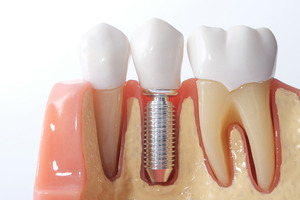
Dental implants have many advantages that other tooth-replacement options don’t, which can make them an excellent choice when you need to fill in a gap in your smile. But what if you decide to have an orthodontic treatment performed at some point in the future? Will your implant posts get in the way? Here is what people with dental implants need to know when considering braces or Invisalign to straighten their grins.
How are Dental Implants Different Than Your Natural Teeth?
Dental implants are the only kind of tooth replacement that can form a bond with your jawbone. As such, it is often said that having dental implants placed is the next best thing to getting your natural teeth back. However, there is an important difference between a real tooth and a dental implant post.
While your teeth are attached to your jaw via periodontal ligaments, dental implants directly fuse with the bone around them. So while it’s possible to change the positions of your teeth by applying pressure to them, dental implants can’t be moved the same way. The result is that orthodontic treatments don’t work on dental implants.
Will Dental Implants Stop You from Having an Orthodontic Treatment Performed?
Does the fact that dental implants are immovable disqualify you from getting braces or Invisalign? Not at all! In many cases, it will still be possible to use orthodontics to change the positions of your natural teeth in order to address a variety of issues. This is especially the case if the teeth that need to be treated are in a different part of the mouth than the dental implant post.
In certain cases, dental implants may actually be able to help with orthodontic treatment. Thanks to their durability and stability, dental implants can act as anchor points that provide the force required to move the nearby teeth.
It’s important to let your dentist or your orthodontist know from the beginning that you have dental implants. That way, they will be able to take your replacement teeth into account when planning your orthodontic treatment.
Why Should You Have Orthodontic Treatment Performed?
There are several reasons why orthodontic treatment may be worth pursuing even after having dental implants placed. Straighter teeth are generally easier to clean, which goes a long way toward helping you keep tooth decay at bay. Furthermore, when your smile is properly aligned, the pressures of biting and chewing are distributed more evenly, and as a result, your teeth won’t suffer as much wear and tear.
Do you have dental implants but are still interested in pursuing orthodontic treatment? Get in touch with your dentist to see what they recommend.
About the Author
Dr. Travis Spillman has more than 20 years of dental experience. He studied dentistry at the University of Texas Dental Branch at Houston. His Dallas practice, Dental Center of Lakewood, offers in-house dental implant placement as well as orthodontic solutions such as Invisalign and traditional braces. To schedule a consultation with Dr. Spillman, visit his website or call (214) 823-5253.
